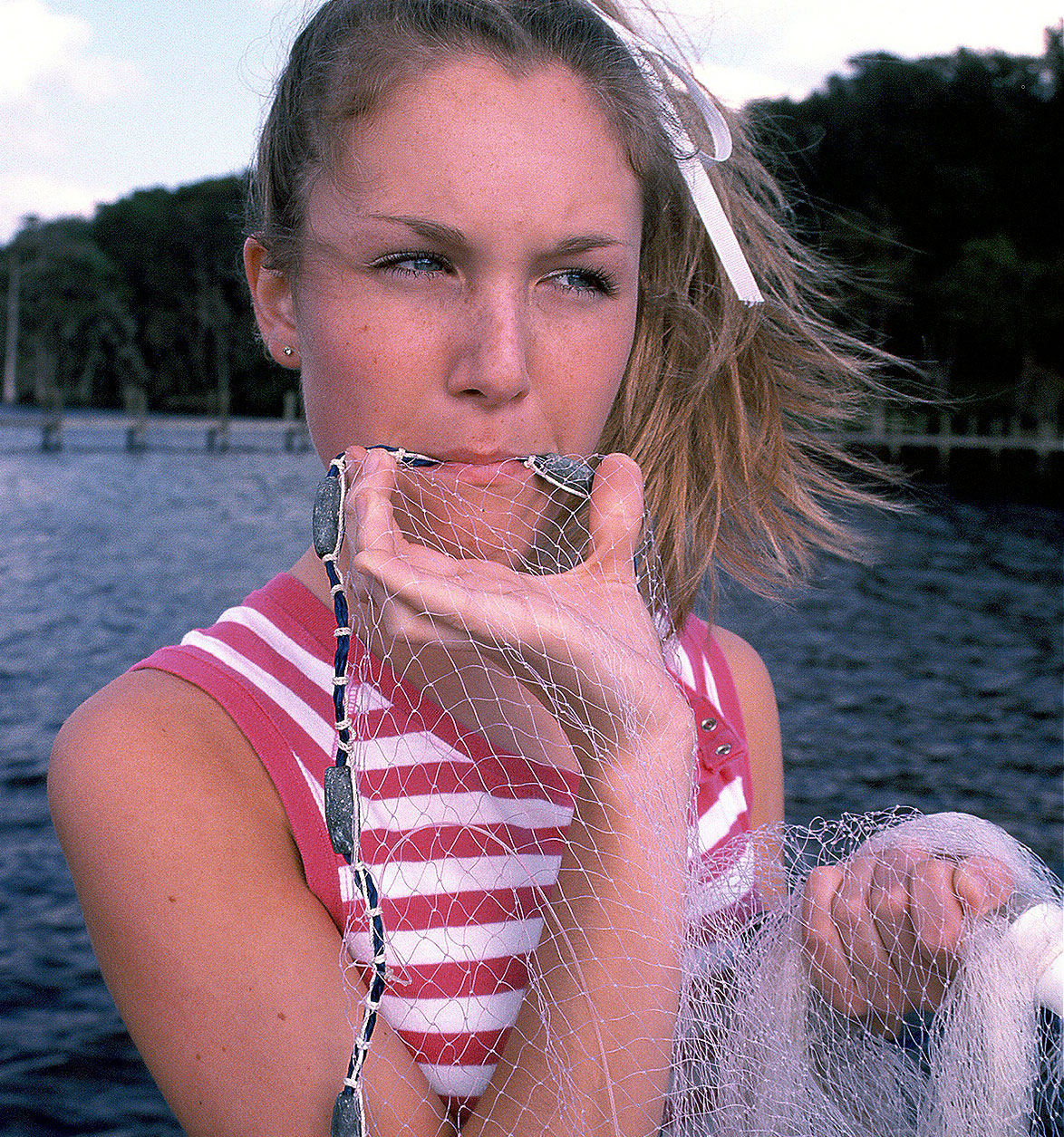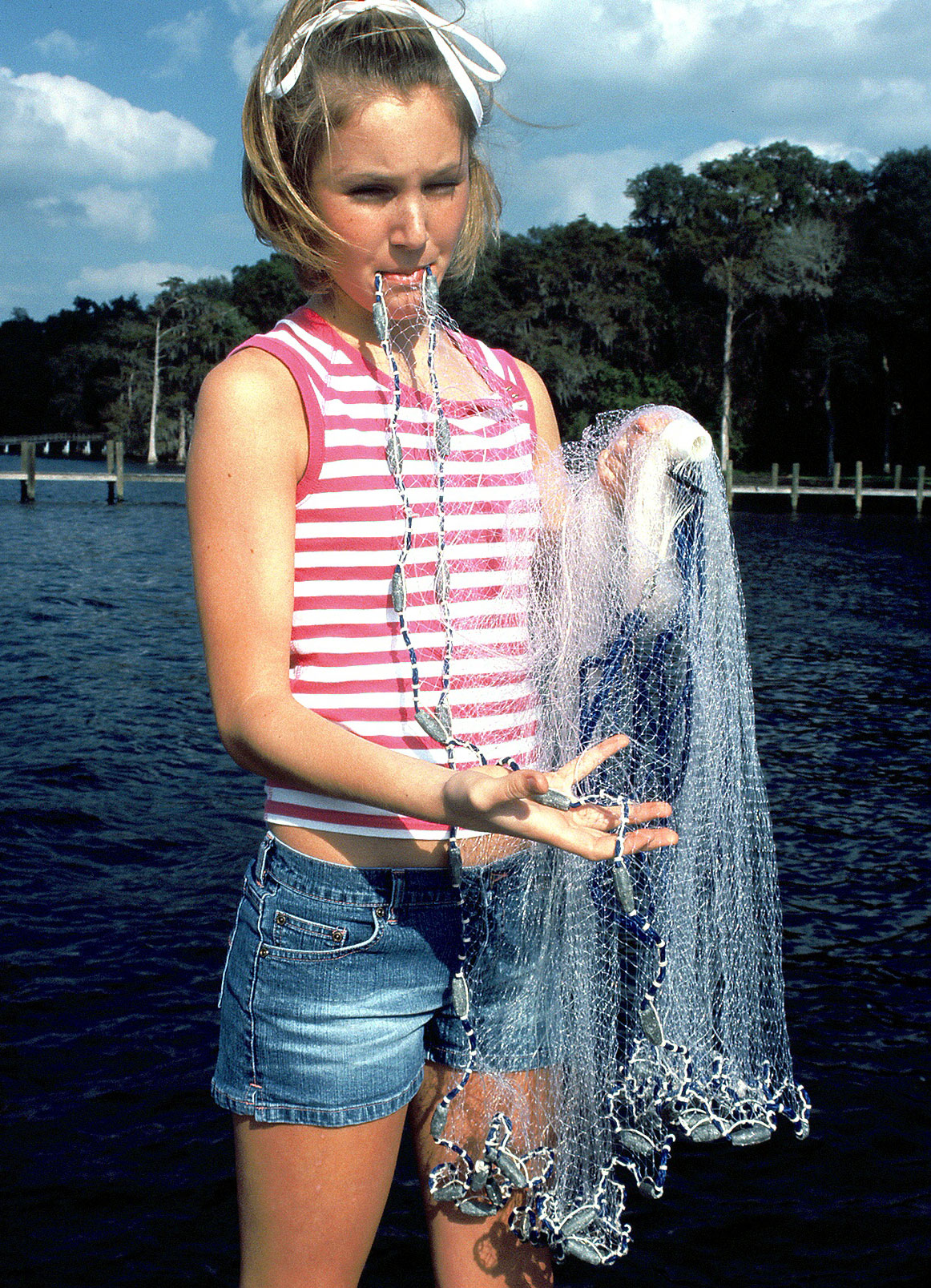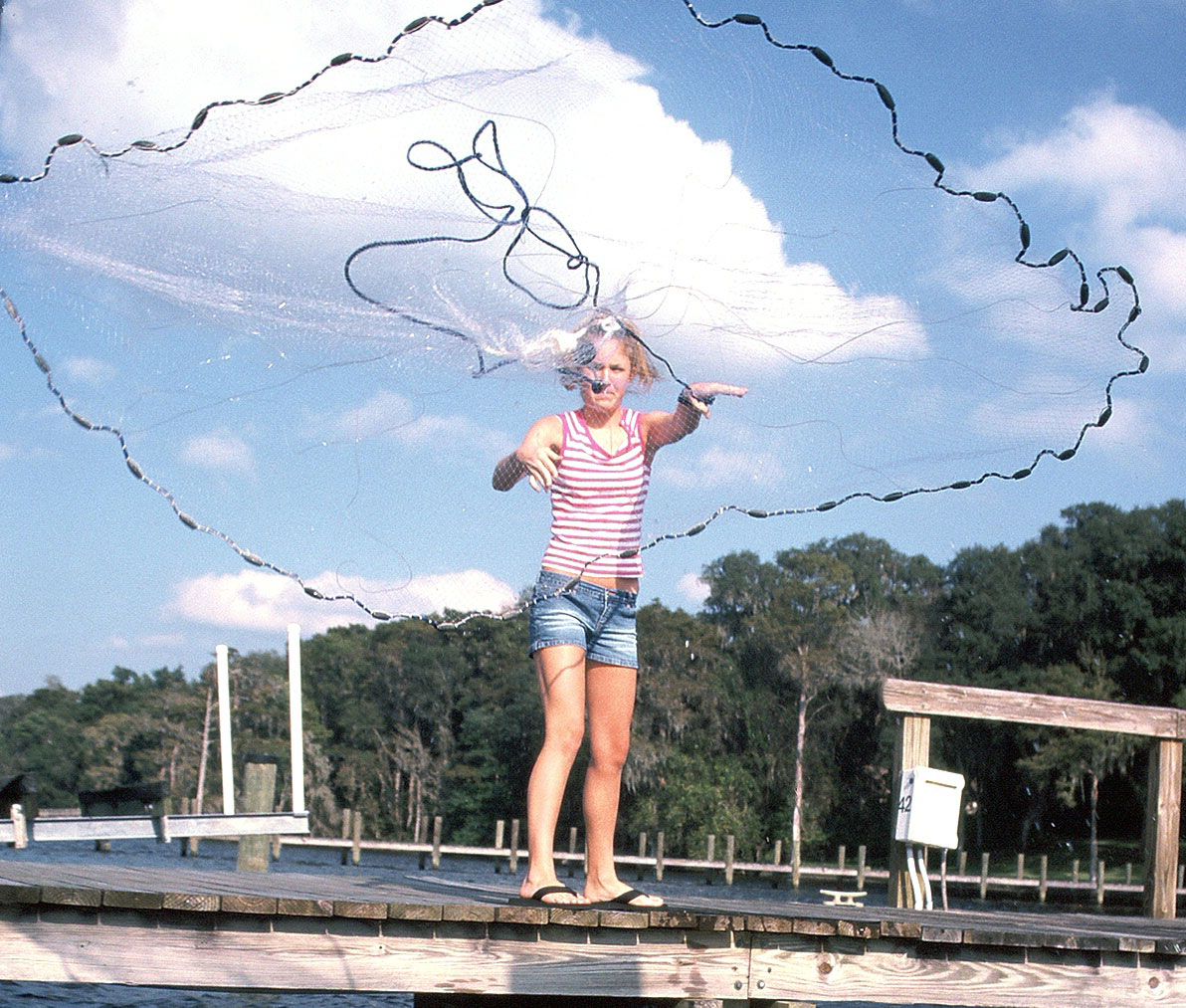We might earn income from the merchandise out there on this web page and take part in affiliate packages. Learn More ›
Getting contemporary, dwell pure bait is vital to a variety of fishing, in freshwater and saltwater. Catching your personal bait with a throw web can save anglers loads of time, cash, and energy. In case you can catch dwell minnows with a throw web within the shallows of your favourite walleye lake, for instance, a visit to the bait store is pointless. Furthermore, the cash spent for bait and fuel touring to-and-from a bait store is healthier used for boat gas. Probably the greatest methods to do that is studying the way to throw a solid web. It’s a easy, simple, and enjoyable method to get all kinds of bait in nearly each waterway.
One other plus for catching your personal bait with a web is that bait caught from lakes and rivers is “native” to that water. It’s extra pure for fish residing in that water to eat full of life, resident bait than bait raised someplace distant in chemical-laced hatchery water.
You’ll see the outcomes on the water. Stay “hatchery” shiners used for bass and different species could also be productive. But it surely’s not as efficient as shiners dwelling in, and caught from, the water the place the bass you wish to catch dwell.
Anglers utilizing solid nets ought to examine state and native legal guidelines governing their use. Additionally, be aware of what species of bait is lawful to catch and maintain when solid netting. In some states, for example, utilizing a solid web is lawful for catching shiners, river baitfish, and tidewater minnows. But when bluegills, crappies, bass, and different sport species are by the way caught in a web, they have to be launched alive instantly. Luckily, small mesh solid nets hardly ever entangle or “gill” bigger sportfish which are caught. So gamefish that ought to be launched are unhurt and survive nicely if promptly returned to the water. Right here’s what else it’s good to find out about solid nets and the way to use them.
Find out how to Throw a Solid Web
There are a lot of nice methods to toss a solid web, however the next technique is without doubt one of the best to study. That is the “Calusa Dry Load” technique, perfected by Roy McDermott and Buster McKenzie, who make Calusa Cast Nets.
The “Dry Load” casting technique is so easy youngsters as younger as age six have realized to throw a four-foot web, with nearly immediate success.
The next steps (for a right-handed particular person) are simple to study, simply go sluggish, and be methodical of their sequence.
Step 1: Vogue a slip knot on the finish of the online’s “throw line,” forming a loop within the line, then slip it over your left wrist and tighten.
Step 2: Kind a collection of free coils with the throw line from the slip knot in your wrist towards the online, then grip the coils together with your left hand.
Step 3: Now maintain the highest of the solid web securely just under its massive “horn,” as proven.
Step 4: Maintain the online by the horn so its lead line weights are simply touching the bottom, collect the online in your proper hand just under your waist, and place the gathered web in your left hand, which can also be holding the throw line coils as proven.
Step 5: Reaching towards the online “lead line” together with your proper hand, slowly start gathering the online in your proper hand, whereas ensuring the online is freed from tangles and particles.
Step 6: Collect about half the online mesh in your proper hand.
Step 7: With the online half in your proper hand, roll that portion of the mesh over your left thumb and web “horn” and briefly relaxation it there, as proven.

Step 8: There now are two “halves” of web, a “excessive” half, and a “low” half.
Step 9: The place the 2 web “halves” make the transition from “excessive” to “low” half, seize the lead line (not a lead) together with your proper hand and put the lead line (between leads) in your lips (not in your tooth) and maintain firmly together with your lips.

Step 10: Now attain down and utilizing the small finger of your proper hand safe the lead line, as proven.

Step 11: Whereas nonetheless holding the lead line, attain up together with your proper hand and seize the portion of the online that has been resting on the thumb of the left hand and the horn of the online.
Step 12: You are actually able to throw the online by making a left-to-right twisting movement, much like throwing a frisbee.

Step 13: Attempt to throw the online up-and-out at a couple of 45-degree angle making it spin. Whereas it takes some velocity and power to throw a solid web, timing and following these steps fastidiously are most vital to profitable solid netting.

Find out how to Select a Solid Web
All solid nets aren’t created equal. Good ones are expensive, however nicely definitely worth the cash. But no single solid web is sweet for all sorts of dwell bait gathering. Web necessities permitting you to greatest catch marine shrimp in shallow water are quite a bit completely different from the very best ones designed for catching shiners or mullet in swift present or in massive open water just like the ocean.
Choose the Proper Mesh Dimension
Utilizing the proper mesh measurement for the bait you’re focusing on is vital. You don’t need mesh measurement too massive when focusing on small minnows, for instance, as a result of some baits might head into the netting and their gills foul within the mesh. Eradicating such “gilled” baits is tough, and sometimes injures fish. In such a case, smaller web mesh measurement is greatest. Typically state or space legal guidelines dictate mesh measurement that can be utilized in numerous waters. Remember to examine native legal guidelines earlier than heading out with a throw web to adjust to mesh measurement legal guidelines.
Right here’s a fast run-down on what sort nets are greatest suited to varied sorts of bait amassing, based on Roy McDermott of Calusa Cast Nets.
- 1/4-inch mesh web: Greatest for very small baitfish below 3-inches. A bonus for this web is it doesn’t “gill” baitfish on account of its small mesh openings. An obstacle is it sinks slowly, so ought to be utilized in water lower than 8-feet deep.
- 3/8-inch mesh web: That is the most well-liked solid web measurement and is greatest utilized in water as much as 12 toes deep for baitfish over 3-inches in size. A superb all-around bait web, it sinks shortly and prevents most baitfish from “gilling.”
- 1/2-inch mesh web: Good for water to twenty toes, nice round bridges and pilings in swift present as a result of bigger mesh permits for a sooner sink price. Wonderful for baitfish 5-inches and bigger, equivalent to massive shiners for bass, shad for striped bass and catfish, alewives for salmon, and menhaden and mullet in saltwater and tidal areas.
- 5/8-inch mesh web: A specifically designed web for working very deep water, as much as 60 toes in open reservoirs, rivers, and the ocean. Used primarily for big baitfish as much as 2-pounds, typically in swift present the place a fast-sinking web is required.
Different Issues to Take into account When Selecting a Solid Web
1. A heavy-duty floating web “hand line” is a should for permitting ease of bait retrieval.
2. A big, well-made swivel is required between the hand line and web connection, with chafing gear linking web brails and the online swivel an vital plus.
3. A big, spherical, heavy-duty plastic “horn” is required to stop web line breakage throughout use.
4. Doubled line within the mesh at vital stress factors on the web horn and alongside the online lead line will guarantee sturdiness. Nets get loads of abuse. So doubled strains in some locations are smart, and are normal on better-quality nets.
5. Web mesh ought to be comfortable and supple so a web casts simply and opens easily. Most business nets are fabricated from high quality nylon monofilament line.
6. Web development ought to be in “panels,” trying like pizza slices. This ensures {that a} web lays out “flat” on floor water following a solid. This helps a web open to its fullest, extending fully spherical, thus capable of corral as a lot bait as potential because it sinks.
7. Web weight ought to be not less than 1.5-pounds per linear foot of web, which means a 10-foot web ought to weigh 15 kilos. This permits for a correct web sink price that collects bait in deep water or swift present. Bigger nets utilized in deeper water require heavier lead strains.
8. Weights ought to be securely mounted to a web lead line to stop mesh weights from slipping. Weights on a lead line take abuse throughout regular bait-catching, so that they have to be tied in firmly to stop issues.
Nets that snag backside obstructions may be massive bother. Snags trigger web mesh tears and require restore. Typically a complete web is destroyed when fouled deep in particles. Brush, tree stumps, branches, rocky backside, jetties, sunken docks, pilings, outdated crab traps and the like are lethal to solid nets. Onerous sand, gravel, shell and dust bottoms which are clear from particles are greatest for solid netting.
9. To keep away from snags and ensure nets aren’t broken or misplaced, anglers with boat sonar are smart to make use of it scanning prime areas for solid netting. Ahead scanning sonar and normal bottom-probing sonar not solely examine for web snaring particles, but additionally assist pinpoint deep bait appropriate for solid netting. Finding deep bait colleges like shad, mullet and even shrimp are significantly aided by utilizing sonar successfully.
10. For deep water solid netting an extra-long foremost line is required. A superb supple “add on” rope that may be related by way of loop to loop to the online foremost line is simple to arrange, and smart to have out there if wanted.
11. When solid netting deep water, it’s smart to pause briefly earlier than hauling in a web. This permits a web to totally attain backside making certain that bait trapped within the mesh is caught. Additionally, slowly pulling the online line assures it closes uniformly and captures all bait inside the mesh.
12. For boaters after deep bait, generally it’s vital to chop the boat engine earlier than solid netting to stop spooking bait. Finding bait pods shortly utilizing a ship motor is ok. However when setting as much as solid web, shutting off the motor might help maintain bait colleges tight and simpler to catch.
13. Good solid nets aren’t low-cost, so it is sensible to spend a couple of minutes after every fishing journey to correctly look after them. Following use, absolutely unfold a web on a snag-free, flat floor, like a paved driveway or garden. Take away all particles and fish elements from a web. Examine the online for minor rips, which ought to be repaired earlier than they grow to be main tears and complications. Rinse the online with freshwater to take away all corrosive components like salt and permit to dry earlier than storing. Retailer a web in a cool, dry place. Hanging a web vertically in a storage or storage space is ok. However make sure a throw web is out of the solar, which might break down and destroy monofilament mesh.
14. Stowing a web in a big plastic bucket out of the solar is sweet and is a handy area saver that retains a web from tangling.
15. If a well-used web feels stiff and brittle, soaking it in a bucket of water having a cup of material softener added rejuvenates its supple mesh. Soak the online for half-hour, then unfold on the bottom to dry, spray with a backyard hose, dry and retailer.
Last Ideas on Find out how to Throw a Solid Web
Throwing a solid web would possibly look sophisticated, however it’s actually not. Simply be sure you select a high quality web that’s the right measurement and design in your waters and goal species. Verify your native laws and get numerous follow on the water. Quickly you’ll be hauling in loads of the very best dwell bait on the market.
